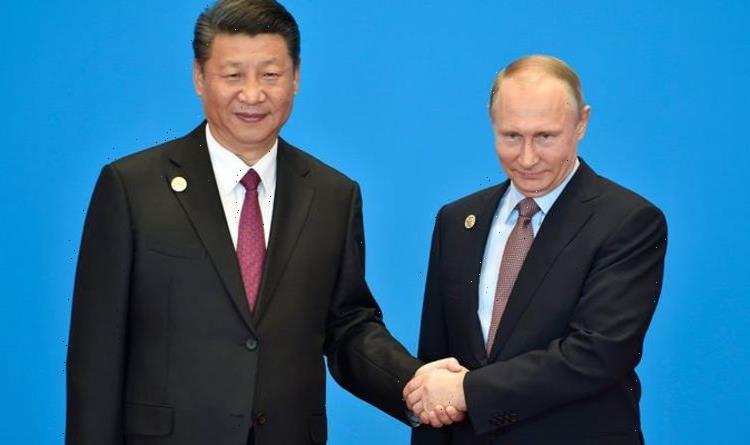China launches first three-man crew to new space station
We use your sign-up to provide content in ways you’ve consented to and to improve our understanding of you. This may include adverts from us and 3rd parties based on our understanding. You can unsubscribe at any time. More info
The first stage of this terrifying collaboration was announced earlier this year when state media shed light on a deal between China and Russia’s state-owned Roscosmos space agency. According to the deal, Roscosmos will install a satellite ground-monitoring station in Shanghai, with China reportedly installing parallel stations in Russia. The announcement took the world by surprise as it marked the first time either country has allowed a foreign power to build tracking stations within their borders.
Additional tracking stations are due to be built in Brazil, Indonesia, India and Angola.
Russia’s TASS press agency quoted Roscmos saying: “All contracts for deploying and operating the equipment were signed with Brazil back in 2020.
“All permissions to take the equipment out of Russia were obtained, too.”
According to the original reports, the tracking stations Precision Instrument-Making Systems to enhance and improve the accuracy of Russia’s GLONASS satellite network.


GLONASS is Russia’s answer to the American Global Positioning System or GPS – a network of satellites that provide real-time positioning and navigation data for public and military use.
The decision to build a tracking station in China has been interpreted as a move to strengthen cooperation between the two nations.
Despite being the world’s very first space power, recent years have seen Russia work more closely with its allies.
And according to a report in The Diplomat, China and Russia have been looking to integrate their satellite systems since at least 2014.
Experts have warned last year that Russia’s drive to engage more with the East has been driven by deteriorating relations with the West.
China: Xi Jinping issues defiant message to foreign powers
A report published in the 21st issue of the China Brief Volume: 20 last, claimed that the “Russian government removed many of these restrictions and substantially expanded space collaboration” with China.
In 2016, President Vladimir Putin paid a visit to Beijing where he signed a bilateral agreement on intellectual property protection in space technologies.
The report added: “Russia and China have since been linking their satellite-based terrestrial navigation systems, the Russian Global Navigation Satellite System (GLONASS) and the Beidou (“Big Dipper_ Global Satellite Navigation System.
“These satellites support civilian and national security functions such as international navigation and communications as well as specific military applications such as precision conventional strikes.”


Russia’s GLONASS presently consists of about two dozen satellites and was first developed during the Soviet era.
Maintaining the satellite network has become and growing issue for Moscow as many of the satellites have already gone past their sell-by date.
Collaborating with China will help the country strengthen its infrastructure and help restore some of the country’s grip over the space sector, according to The Diplomat’s Emily Young Carr.
Besides the US, China and Russia are the only space powers to have launched crewed missions into orbit.
Russia is also a key player in the International Space Station (ISS) and until 2019, launched all of the US’s and European Space Agency’s (ESA’s) astronauts into orbit.
China, meanwhile, has been rapidly growing its space programme in recent years and has landed probes on the Moon and Mars, and is now building its space station.
According to The Diplomat, the partnership between China and Russia will serve to weaken the US’s sphere of influence, give both countries increased access to data and intelligence, and limit the US’s “power projection capabilities”.
However, the report noted this is likely not going to be entirely seamless cooperation but one that is “worth watching”.
Source: Read Full Article
